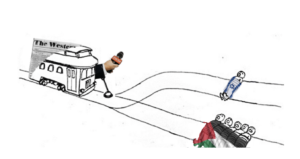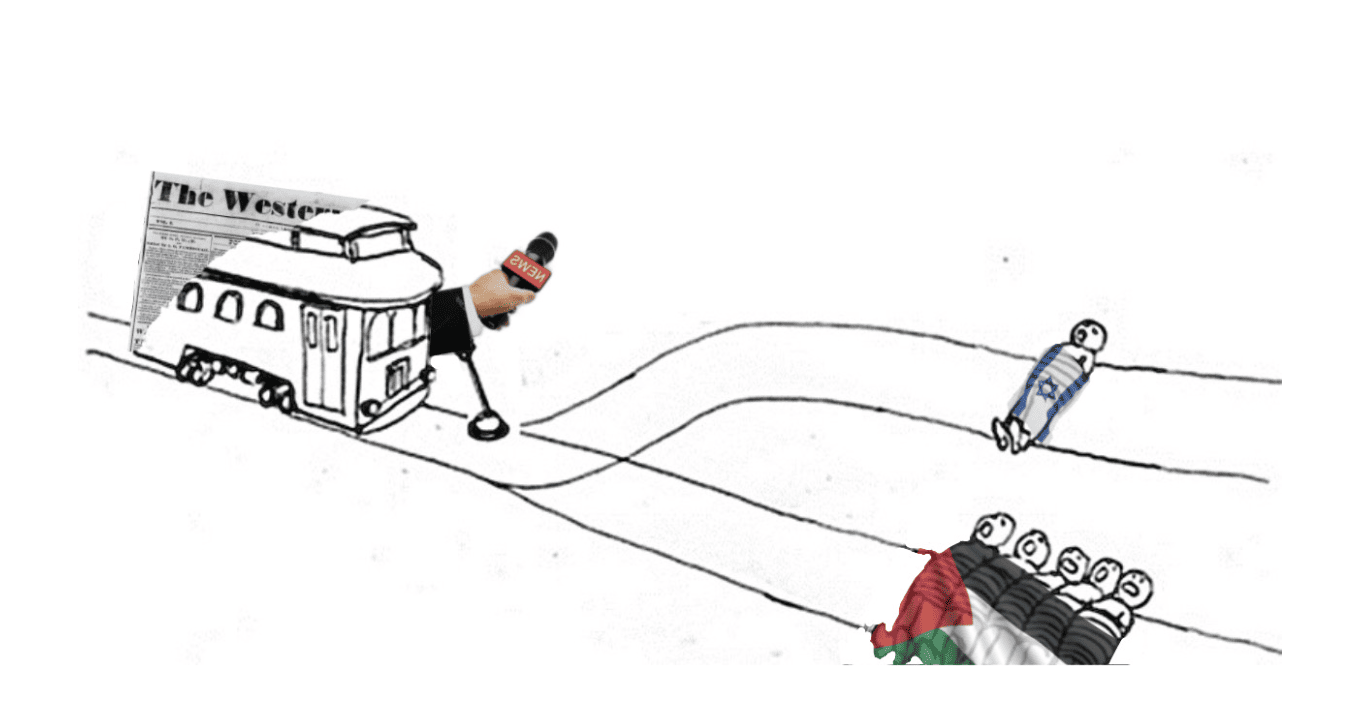
Credits: NYMAG
image manipulation bby the author
The foundational essence of journalism is objectivity. However, though clearly outlined in the editorial guidelines of most Western media, such neutrality and nonpartisanship do not seem to apply to the Israel-Palestine conflict. Western media has forgotten that power and media are interlinked by the use of words, and that the semantic dimension of biased titles contributes to the spread of falsified perceptions.
When it comes to the use of language in Western media, this problem is not a new phenomenon. However, with the rise in broadcasts concerning the Israeli-Palestinian region following the events of October 7th, this issue has resurfaced.
Taking the example of the BBC’s camouflaged bias, the news media’s use of language from tweets to broadcasts has been increasingly pro-Israel, whilst largely condemning pro-Palestine language. In an article published on the 16th of October, the BBC’s Chief International Correspondent in southern Israel questioned whether Hamas is building tunnels under hospitals and schools. The use of the word ‘hospitals’ here indirectly refers to the controversial bombing of a hospital in Gaza, which resulted in almost 500 deaths according to UN officials – suggesting, though not directly stating, that the incident was caused by Hamas itself. Unavoidably, the use of indirect references like these takes away responsibility from finding out who actually is behind this appalling loss of human lives.
This biased deliberation is manifested in the semantic dimension of words that Western media uses.
An article published on October 12th in The Economist’s “World in Brief” section was titled “Hamas’s atrocities and Israel’s retaliation will change both sides forever.”
Now, let’s apply a lexicological analysis to the use of the words “atrocities” and “retaliation”.
“Atrocity”, as defined by the Oxford Dictionary, is “a cruel and violent act.” Objectively and in itself, it is descriptive of a situation where civilians are subject to bombing. However, when paired with the use of “retaliation” subjected to Israel’s reaction, the title becomes problematic.
The Oxford Dictionary defines “retaliation” as an “action that a person takes against somebody who has harmed them in some way.”
This suggests that Israel’s retaliation is completely justified and proportionate to Hamas’s bombing. However, when taking into account the context of the conflict, Israel’s reaction is now better described as a “massive retaliation,” defined in terms of war terminology when “a state commits itself to retaliate in much greater force than when attacked.” Considering the death toll of the events of October 7th resulting from Israel’s “retaliation”, this seems to be a more descriptive and realistic choice of a noun.
In fact, whilst hundreds of Israeli lives were lost, thousands of Palestinians lost theirs in consequence. Although it is hard to find independent and unbiased data displaying the death toll of the conflict since October 7th, the proportionality of the conflict’s death toll is incontestable.
This is not to say that a smaller number of deaths would, in any way, be less tragic. Every human life lost counts.
However, such a dangerous narrative where Israel’s offensive against Palestine would be proportional and comparable to Palestine’s own retaliation, does make the larger number of Palestinian deaths seem more acceptable.
The bias of Western media inevitably stems from Western states’ indomitable support for Israel. Ironically, although a comparison of the conflict has been drawn with Russia’s war on Ukraine, Israel’s war strategy has been compared with that of Russia’s. Almost ten days after Hamas’ bombing on October 7th, The Economist rather nonchalantly published an article titled “Israel’s commanders will be studying Russia’s mistakes.”
Accused of double standards when it comes to Ukrainians and Palestinians, many of Western states are faced with a difficult decision. Echoing the ancient trolley problem, Western media seems to be in the same position as the conductor. The moral dilemma of forcing a person to choose between one “friend” and five “strangers” mirrors the media’s approach to coverage of the conflict. Do multiple Palestinian lives, a stance unpopular amongst Western countries, equal one Israeli life – someone who is known to the West, and someone whose side they are used to taking?
One Palestinian life should not equal one-fifth of an Israeli’s.
Even Mathias Vicherat’s emails are representative of this problem of language. In an email sent on the 9th of October to all students of Sciences Po, he stated that Israel has been the “target of a series of appalling terrorist attacks.”
It is not controversial to describe Hamas’ actions on October 7th as “terrorist attacks.” However, the use of the adjective “appalling” to describe the death of Israelis (as is perfectly descriptive when it comes to the loss of lives) without including such a remark about the loss of Palestinian lives is problematic. This depicts the paradox of the inability of Western media to shed light on the atrocities that both sides in the conflict have had to entail. Vicherat continues to state that “The provisional death toll from these attacks and the ensuing response has already reached hundreds”, failing to mention that the said “provisional death toll” consists largely of Palestinian lives.
By definition, the term genocide as “a crime committed with the intent to destroy a national, ethnic, racial or religious group, in whole or in part,” correlates with, as put forward by some UN officials, “The current wholesale slaughter of the Palestinian people, rooted in an ethno-nationalist colonial settler ideology.”
Whilst it is not wrong to refer to Hamas’ attack as terrorism, it should be as uncontroversial to use the word genocide when it comes to the insurmountable number of Palestinian deaths among other factors.
Furthermore, the Israeli government’s decisions throughout the conflict, and especially after the events of October 7th, are also perfectly descriptive of war crimes, as outlined in the United Nations Charter.
On the other hand, it is wrong to describe the Israeli government’s “retaliation” as proportional and fair. It will always be wrong to use biased language in news articles that are supposed to inform, rather than alter opinions.
No matter your view or understanding of the conflict, facts and statistics are as objective as information can get. Though no one is inherently capable of entailing perfect objectivity, journalists should understand and bear the responsibility of what their words entail. A Palestinian life does not equal one-fifth of another, and the loss of a human life will always be appalling, atrocious and horrendous, no matter whose it is.
Other posts that may interest you:
- Insight into the Warwick Economics Summit: A Discussion on the UK’s Economic System with Sir Howard Davies
- La grève des scénaristes et des acteurs: Hollywood en péril ?
- A forbidden fruit — nourished in shadows,
- Paris, December 21
- At your mercy at the coffee shop
Discover more from The Sundial Press
Subscribe to get the latest posts sent to your email.





